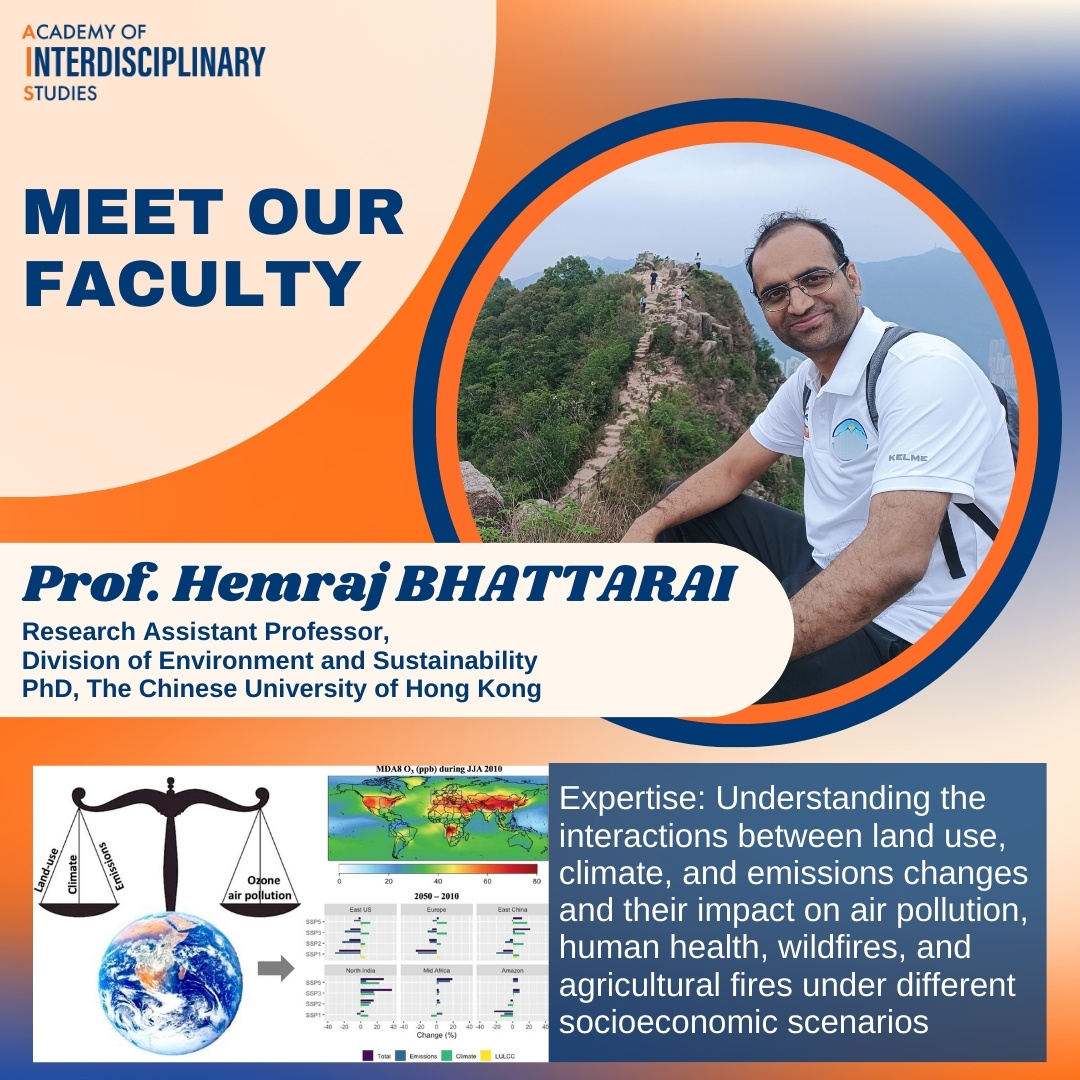We are delighted to welcome Prof. Hemraj BHATTARAI, who has recently joined the Division of Environment and Sustainability (ENVR) as a Research Assistant Professor.
With academic and research experience spanning Nepal, Mainland China, and Hong Kong, Prof. Bhattarai investigates the links between land use, climate change, and air quality, with a focus on their impacts on human health. At ENVR, he will employ data modeling, observations, and machine learning to identify pollution sources and forecast environmental risks, generating evidence that can inform policy and practice.
Read on to discover how his research is advancing new insights into the global challenges of air pollution and climate change.
-----
Could you tell us more about you?
I am originally from Nepal, where I completed my undergraduate studies in Environmental Science and Management before pursuing graduate education in Mainland China and Hong Kong. I earned my Ph.D. in Earth and Atmospheric Sciences from The Chinese University of Hong Kong (CUHK) in 2024, where I studied the impacts of changes in land use, climate, and emissions on global air quality. After my Ph.D., I worked as a Postdoctoral Fellow at CUHK, focusing on wildfires, agricultural burning, and their impacts on air pollution and human health using global models and machine learning (ML) techniques. In September 2025, I joined HKUST as a Research Assistant Professor. My research here will leverage modeling, observations, and ML approaches to better understand air pollution sources and health effects. I was drawn to HKUST because of its strong interdisciplinary focus and vibrant research environment, which I believe are essential for addressing today’s pressing environmental challenges. I look forward to working closely with faculty and students to address burning environmental challenges and achieve sustainability.
What inspired you to specialize in this line of research?
Growing up in rural Nepal, where biofuel (mainly wood) was the primary cooking source, I experienced firsthand impacts of biomass burning. On a broader scale, I witnessed severe air pollution, particularly during winter seasons when smoke from biomass burning and urban emissions heavily affected daily life. These early experiences motivated me to study environmental science and later pursue research in atmospheric chemistry and climate interactions. During my M.Sc. and Ph.D., I became increasingly fascinated by how local and regional issues, such as crop residue burning in South Asia, are closely linked to global patterns of air quality and climate change. I was inspired by the realization that scientific research can bridge these scales, providing insights that are both globally relevant and locally actionable. My motivation is also deeply rooted in urgency: millions of lives are affected by air pollution each year, and science plays a critical role in shaping solutions to protect health and ecosystems.
What impact do you want your work to have on society?
My ultimate goal is to generate scientific knowledge that directly supports healthier, more sustainable societies. Air pollution is not only an environmental issue but also a major public health challenge, particularly in Asia, where rapid development and agricultural burning affect large populations. I hope my research will help quantify the health impacts of air pollution, improve predictions of future risks under climate change, and identify effective strategies for mitigation. At HKUST, I aim to develop modeling and data-driven tools that inform policymakers and stakeholders, bridging the gap between research and practice. Beyond academia, I aspire to empower communities and decision-makers with reliable evidence, contributing to cleaner air, reduced health burdens, and more climate-resilient cities.
Do you have any advice for students interested in your research area?
My main advice would be to stay curious and open-minded, as environmental and atmospheric science is inherently interdisciplinary. Do not hesitate to combine methods from different fields – observations, modeling, and data science all have unique strengths and, when integrated, can generate powerful insights. It is equally important to link scientific questions with societal relevance: understanding not only “what” happens in the atmosphere, but also “why it matters” for people’s health, ecosystems, and policies. Technical skills in coding, data analysis, and handling large datasets are extremely useful, but critical thinking and the ability to ask meaningful questions are even more important. Finally, I encourage students to seek mentorship, collaborate across disciplines, and engage in international networks – science is a global effort, and collective knowledge will drive the greatest impact.
Could you share a fun fact about you?
Once I joined an expedition in the Himalayas at around 4500 m above sea level to track Snow Leopards. The local guide took us to an area where the elusive animals are usually spotted. Luckily, we didn’t encounter one directly (which might explain why I’m still here today!), but we managed to collect fur and fresh scat samples for further analysis.





